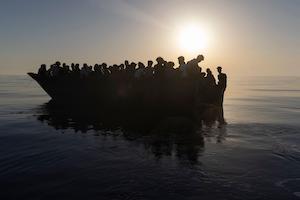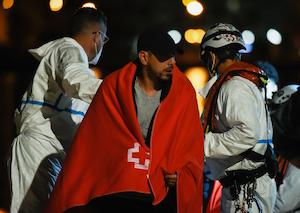In the early morning hours of 3 October 2013, over 360 people died in the Mediterranean Sea near the Italian island of Lampedusa. They had boarded a small fishing trawler, fleeing Libya. The Italian coastguard ignored their calls for help.
The tragedy seemed like a catalyst for change at the time and led to increased European efforts to save those attempting the perilous crossing – but overall, not much has changed in the 10 years since the incident, NGOs and academics say.
Today, Lampedusa is still at the heart of Europe’s migration crisis. Over a period of six days in September this year, 11,000 migrants landed on the island, overwhelming its ports. At least 2,093 people died in the central Mediterranean between January and September 2023, according to the International Organization for Migration.
“There needs to be a policy focused on human rights protection, rather than border protection,” says Matteo de Bellis, a researcher on migration and asylum at Amnesty International’s Brussels office.
At present, search and rescue operations conducted by Member states are not covered by a common European Union legal framework, except for operations carried out as part of joint operations at sea led by Frontex, the EU’s border control agency.
Following a plenary debate this July, members of the European Parliament adopted a resolution asking for the European Union to increase its efforts to save migrants in danger at sea. They called for “more active and co-ordinated search and rescue operations,” and for “Member states and Frontex to provide sufficient capacity in terms of vessels, equipment and personnel”.
MEP Lena Düpont (EPP/DE), chair of the parliament’s Frontex Scrutiny Working Group, applauds the resolution. “Safe and legal pathways for those in need of international protection are the best ways of avoiding loss of lives,” she says. “We need a permanent procedure for search and rescue based on international and European law.”
 A boat in the central Mediterranean| Photo: Alamy
A boat in the central Mediterranean| Photo: Alamy
MEP Juan Fernando Lopez Aguilar (S&D/SP), chair of the parliamentary Civil Liberties Committee, says the EU needs to start treating migration as “a fact” rather than a threat: “There is no way the European Union can prevent migration. The only way to move forward is to address it together and make that consistent with EU values and international humanitarian law.”
Shortly after the 2013 tragedy, the Italian government mounted a vast search and rescue operation aimed at preventing the deaths of thousands who attempt the journey from Africa to Europe. With a budget of €9m per month, the operation, dubbed Mare Nostrum (“our sea” in Latin), was estimated to have saved 130,000 people in just a few months.
But Mare Nostrum did not last. Due to several factors, including budgetary constraints and a fear that the operation was legitimising irregular migration, it shut down a year later in October 2014. Six months later, in April 2015, a ship believed to have been carrying almost 1,000 people sunk close to the island – with authorities managing to save just under 100 migrants.
“We see that when a few thousand people try to reach Europe and get stranded at its borders, because they are forced to travel irregularly by the absence of adequate, safe and legal avenues,” Amnesty’s de Bellis says, “their arrival is always portrayed as a crisis. But this is a crisis that has been made by the EU Member states and institutions.”
In 2021, Amnesty International – along with Human Rights Watch and the European Council on Refugees and Exiles, an NGO focusing on the implementation of the EU’s asylum laws – published an action plan outlining 20 steps for the EU to take to address the situation in the central Mediterranean. Putting in place more proactive search and rescue operations was one of the document’s central recommendations.
“The responsibility to save does not depend on jurisdiction," says Irini Papanicolopulu, a professor in international law at SOAS University of London. “International law dictates that anyone who can rescue, must rescue."
 A man rescued at sea arrives in Spain | Photo: Alamy
A man rescued at sea arrives in Spain | Photo: Alamy
It is true that practical elements must also be taken into consideration, Papanicolopulu explains, as in certain cases it makes sense for the nation geographically closest to an incident to come to the rescue. As an organisation of states in which each member keeps a certain degree of independence, the EU admittedly presents a special case, but “there is very strong integration,” she explains. “And this integration is so strong, that it is considered that the border of all states is the border of the European Union. The coast of Italy is the coast of the European Union.”
Asked for a comment, European Commissioner for Home Affairs Ylva Johansson describes saving lives at sea as a moral imperative, as well as a legal obligation for EU countries under international law. “This is done independently from the circumstances which have led people to be in distress at sea,” she says in a statement sent to The Parliament. “Search and rescue activities are a responsibility of Member states.”
Italy, Malta and Spain have all previously hampered the work of organisations working to rescue migrants. The NGO Sea-Watch says it was required to use one of its own boats to save 14 people recently, as calls to the Maltese authorities pleading for help were left unanswered.
Once again Italy is fuelling a cycle of abuse
"Once again Italy is fuelling a cycle of abuse,” Sea-Watch spokesperson Giorgia Linardi told the European Commission for Human Rights this October, referring to both the country’s hampering of efforts by her organisation to save lives at sea, as well as its known practice of pushing migrants back towards Libya and Syria – the very countries they had sought to flee. Pushbacks of migrants to unsafe countries are illegal under EU and international law.
The organisation has taken Frontex to court, asking for more transparency regarding its rescue missions. A hearing took place before the General Court of the EU on 11 October; a decision is still pending. Sea-Watch suspects Frontex has previously informed Libyan authorities of the locations of vessels it has seen in the Mediterranean, and the NGO is asking the court to compel the border control agency to make public certain documents pertaining to its operations.
For its part, Frontex says divulging more information would put its operations at risk. “We are fully aware that our mission extends beyond safeguarding borders,” the agency says in a statement sent to The Parliament. “It lies, fundamentally, in the preservation of life, dignity, and the fundamental rights of all those we encounter in our operations. Frontex remains committed to balancing transparency with the need to protect sensitive operational information.”
Sign up to The Parliament's weekly newsletter
Every Friday our editorial team goes behind the headlines to offer insight and analysis on the key stories driving the EU agenda. Subscribe for free here.